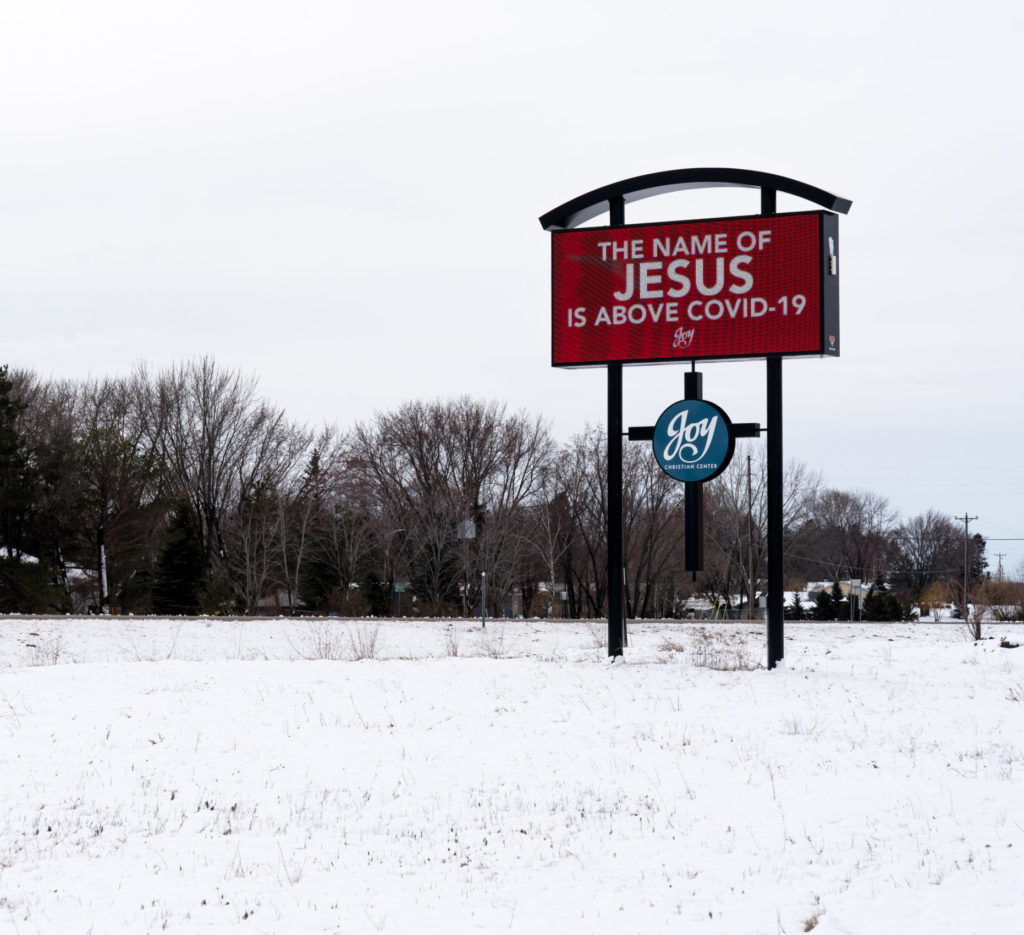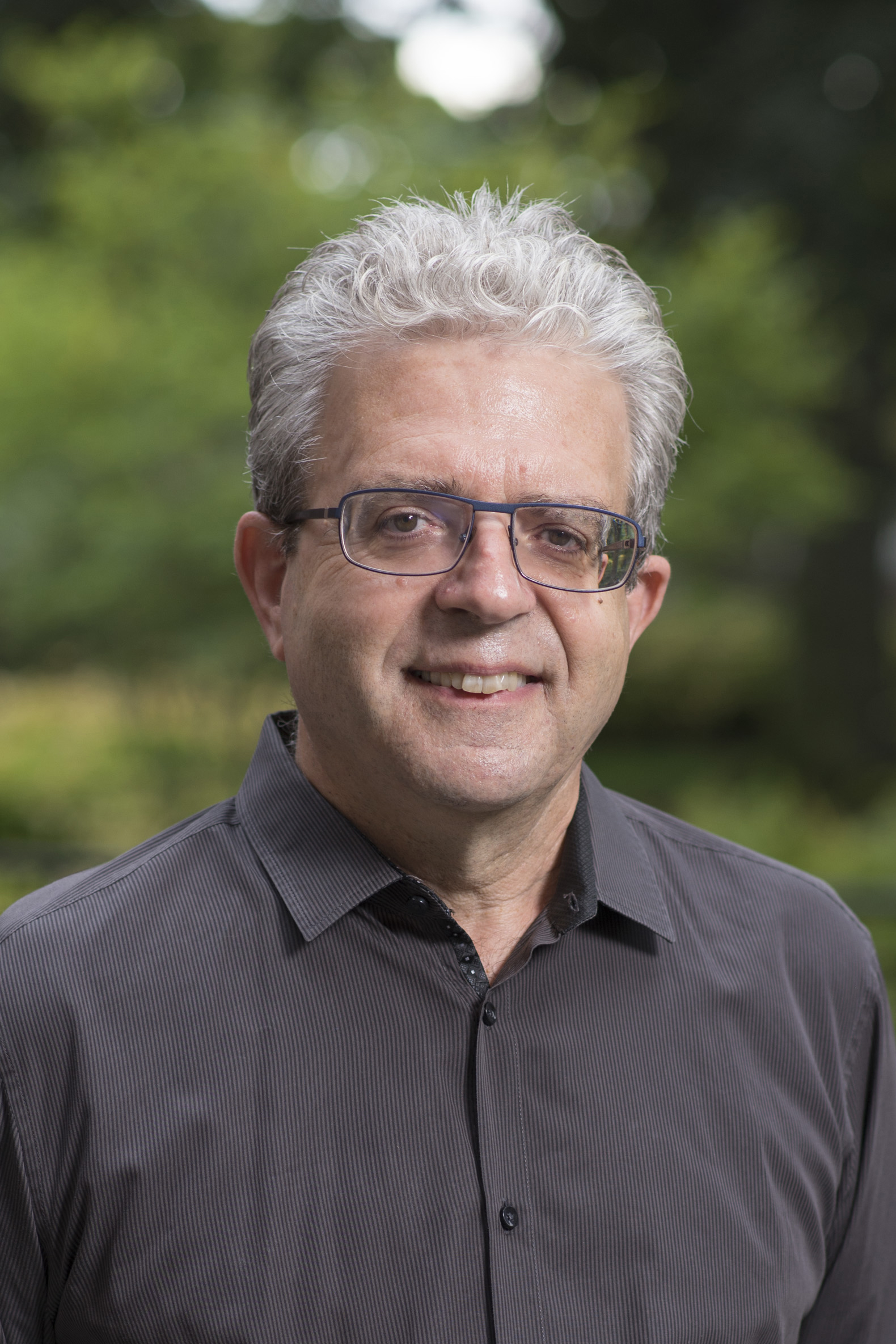
The woman leans confidently out of her car window, her right hand at high noon on the steering wheel. “I wouldn’t be anywhere else,” she tells the reporter for CNN, who has just asked about her decision to attend a crowded late afternoon evangelical church service in the middle of a deadly global pandemic. “Aren’t you concerned you could infect other people inside?” the reporter presses. The woman swings her head defiantly, her straight black hair catching the overhead lights. “No, no, I’m covered in Jesus’s blood,” she says. People who don’t go to her church “could get me sick,” she says, when she goes to Walmart or Home Depot, “but I’m not, because I’m covered in Jesus’s blood.” Then she drives off.
It may protect this woman against infection, but Jesus’s blood paints me into an epistemological corner. I have argued for an approach to religion I’ve been calling plural ontological realism, which in this case means I take this woman at her word: her experience of Jesus being really present to her in the community of other Christians (she was clear in her brief comments how important the church was to her) protects her from infection (and perhaps from infecting others, although she seemed to care less about this). I am committed to resisting the impulse, deep in the theoretical inheritances of the modern study of religion, to lift this woman out of the ontology in which she became (or remade herself as) a subject and through which she lives her subjectivity in relation to others, among whom are, in this instance, the people she meets in Walmart and Home Depot. Any theoretical work about the role of religion must begin (although it does not end) with the reality of this woman’s claim of immunity, within her world, without translating it, and relocating her, into alien ontologies. This is not to suggest that her world is singular: it is adjacent to and cross-cut by other ontologies (such as the reporter’s). Amid this ontological diversity, evangelical Christianity of a particular sort is determinative for this woman, at this moment in history and in her life.
Every sentence of the preceding paragraph requires discussion, but this is not why I am here right now. Rather, I want to think outwards from the corner. I begin by wondering why, ever since I heard this woman’s comment on the night’s news, I have been feeling I needed to do something about it. What is this imperative and where does it come from? Is it the disciplinary impulse to speak for others (she seems to be doing ok on this front); or, is it the drive to translate her to others? If it’s the latter, then to what end? The way the question insisted on itself to me was specifically in the form: what is to be done about this woman? Eventually, I came to see this as an articulation of the drive to power that moves through the study of “religion” in modernity. We scholars of religion are more aware of this drive now, but, still, the temptation exists to offer our services as deputies of law and order. Resisting this is the first thing to do in response to this woman’s statement about being washed in Jesus’s blood. I accept the ontology of facts as given: she continues to shop at Walmart in a pandemic because she is protected by the blood of the Lord in which she has been washed.
Ontology is not a structural or structuring given; it is the living environment of experience, imagination, relationship, and understanding. This woman leaning out of the car on an Ohio evening lives amid “a plurality of actual worlds,” in philosopher Markus Gabriel’s words, and so do we who do not share her vision (16).[1] This plurality calls for, in response, a disciplined agility in moving among worlds, a sort of ontological multilingualism. Sometimes, in certain circumstances, such agility is possessed by religious practitioners themselves (and not just in the modern or contemporary eras). This woman might have thought to herself, well, when I’m in Walmart, I will be among people who do not live in my world and I must act accordingly. Why she apparently does not is itself a question for religious, historical, psychological, and sociological analysis. To accept the plurality of actual worlds is to recognize discrepancies of power among them, as well as within them. This woman’s world appears to be underwritten by the privileges of whiteness, social class, and a certain kind of Protestantism that has been aligned—as much by scholars of evangelicalism as by politicians—with US nationalism in its most exclusivist iterations.
Leaning out of her window, the evangelical Christian woman in Ohio was speaking a world that was as much political as religious, as racially white as Christian (although African American and Latinx evangelical Christians have been heard to say similar things, which raises some interesting questions too), and as nationalist as evangelical. It is neoliberal in its qualified individualism (qualified by the allusion to the fellowship of others like her, in the context of which her supernatural immunity is given). It is exclusionary. Christ’s blood is circulating through all of this. And it is circulating through the insistence of Georgia’s governor on opening bowling alleys, tattoo parlors, hair salons, and fitness clubs well before knowledgeable health experts think it is safe to do so, even though he makes no reference to Christ or his blood. In this way, plural ontological realism renders the old sacred/secular dualism otiose.
If I am not thinking about what I might do about this woman, what’s on my mind in the corner? I am curious about how this woman’s neighbors are responding to her confidence in Jesus’s blood, if they do not share it, or her non-evangelical family members, and how she will deal with their concerns in turn. Why is she (seemingly) unable to extend Jesus’s protective ablution to all people or to align it with the self-sacrifices of health care professionals in this time, to see the holy in the work of doctors, nurses, and orderlies? I am aware that her most strident construction of her ontology comes in response to a question posed by a representative of what has been framed in her world as “fake news.” Would she be as strident were her voice not amplified at the highest levels of political and economic power? I wonder if this woman is ever drawn to realities that are alien to the ones she knows and, if so, where she may encounter them. I also acknowledge—as a citizen of this democracy—that I find her position on the pandemic absolutely terrifying. I have been intrigued by an idea circulating among my solidly left-wing Twitter friends that asks people who refuse social distancing on ontological grounds to accept responsibility for their health care if they are infected with Covid-19 and to be taxed accordingly for the health of others. Ontology creates responsibility, for this woman—and for those of us who live alongside her.
I cannot reassure anyone that what this woman says is “not religion,” “not Christianity,” that she is crazy, that hers is an example of bad Christian evangelicalism versus some putatively good version of it, or that her claim of supernatural immunity is alien to the world that “we” moderns ostensibly inhabit. That is modern religion on display in the Ohio parking lot. The attempt to cauterize it with any prefix—anti/pre/alternative—is self-delusion. Religion(s) have rarely been “modern” in the normative sense of the word. The other-than-modern quality of modern religion empowers the challenge particular religious actors pose to contemporary political conventions, for instance. It also makes religion(s) exceedingly dangerous. We need new ways of thinking about how to live with, and against, ontologies as threatening to our common life as this woman’s is, before she kills us all.
[1] Gabriel defines “ontology” as “the systematic investigation into the meaning of ‘existence,’ or rather the investigation of existence itself aided by insight into the meaning of ‘existence’” (5). There is a new interest in ontology and in what might be called lived metaphysics across the disciplines. A helpful overview may be found in Greg Anderson, The Realness of Things Past: Ancient Greece and Ontological History (New York: Oxford University Press, 2018).

